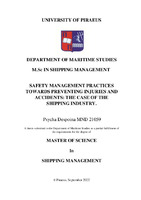Safety management practices towards preventing injuries and accidents : the case of the shipping industry

Master Thesis
Συγγραφέας
Psycha, Despoina
Ψύχα, Δέσποινα
Ημερομηνία
2022-09Επιβλέπων
Karakasnaki, MariaΚαρακασνάκη, Μαρία
Προβολή/
Περίληψη
Αυτή η εργασία συζητά τη βασική φιλοσοφία της πρόληψης ναυτικών ατυχημάτων,
τα πραγματικά γεγονότα που σχετίζονται με τα ατυχήματα, το διεθνές κανονιστικό
πλαίσιο, την ψυχολογία της ασφάλειας, την κόπωση, τα εργατικά ατυχήματα, την
οργάνωση που απαιτείται για την πρόληψη ατυχημάτων και τις διάφορες μεθόδους
εκπαίδευσης και εκπαίδευσης των εργαζομένων.
Μια λεπτομερής ανάλυση όλου του διεθνούς ρυθμιστικού πλαισίου όπως ο IMO, η
SOLAS, η STCW, η ISPS και η MARPOL αποτελούν το κλειδί για αυτή τη διατριβή
μαζί με μια ανάλυση τριών μεγάλων ατυχημάτων που έχουν συμβεί στη ναυτιλιακή
βιομηχανία, αυτά των πλοίων μεταφοράς χύδην φορτίου M/ V Derbyshire (1980),
M/V Treasure (2000) και M/V Harita Bauxite (2013). Και τα τρία πλοία μεταφοράς
χύδην φορτίου βυθίστηκαν σε διαφορετικές θαλάσσιες περιοχές και διαφορετικές
χρονικές περιόδους λόγω κακοκαιρίας, αφού υπέστησαν σοβαρές ζημιές στο κύτος
τους. Πραγματοποιήθηκε ανάλυση του συμβάντος, προκειμένου να αναλυθούν τα υπό
συζήτηση ατυχήματα. Σύμφωνα με την ανάλυση, τα ατυχήματα συνέβησαν κυρίως
λόγω της δομής των πλοίων, με το κύτος τους να μην είναι κατάλληλο και τα
καλύμματα των καταπατών φορτίου να μην είναι αρκετά ισχυρά ώστε να
αντιστέκονται στις πιέσεις που επιβάλλονται από μεγάλα και επιθετικά κύματα, ενώ
στην περίπτωση του βαποριού Harita Bauxite βρέθηκε το φορτίο να είναι πολύ υγρό
για να αντέξει το κύτος του σκάφους στη βαριά κύλιση του πλοίου σε δύσκολες
καιρικές συνθήκες. Τα ατυχήματα αυτά, δεν είναι τα μόνα όπου έχουν αναφερθεί για
τους ίδιους λόγους και αιτίες, και όπου όλα υποτίθεται είχαν σκοπό να
ακολουθήσουν τον Διεθνή Ναυτιλιακό Οργανισμό (IMO), να τροποποιήσει τις
συμβάσεις του και να αναπτύξει νέους και αυστηρότερους κανονισμούς σχετικά με το
σχεδιασμό και τη δομή των πλοίων, καθώς και την αποθήκευση του φορτίου και του
χειρισμού του στην πολύ ευαίσθητη και σημαντική περίπτωση των πλοίων μεταφοράς
χύδην φορτίου. Το γεγονός ότι το ατύχημα του M/V Harita Bauxite συνέβη πρόσφατα
το 2013 υποδηλώνει ότι τα διδάγματα δεν έχουν ακόμη παρθεί, υποδεικνύοντας έτσι
ότι ο Διεθνής Ναυτιλιακός Οργανισμός (ΙΜΟ) πρέπει να γίνει αυστηρότερος και
αποτελεσματικότερος όσον αφορά την ταχεία εφαρμογή των συμβάσεων και των
κανονισμών του.


